Hey Folks,
I have exciting news!
This week, I will be appearing on the Geopolitics and Empire podcast with Paul Cudenec, Etienne de la Boetie2, and Hrvoje Moric. Pretty thrilling!
The story of how this interview came to be is interesting.
Basically, Etienne de la Boetie2 asked me to put him in touch with Paul Cudenec, because he is basically encouraging anarchists to unite under the banner of “voluntaryism”.
This is something that he is doing in advance of the upcoming Voluntaryism conference, which will be happening this November 1-3, in Sedona Arizona.
Etienne has also written a book about Voluntaryism which is coming out soon!
Personally, I applaud Etienne’s efforts. I like that he is organizing IRL, as opposed to only on the internet. Although media activism is important, at some point we’re going to have to come together and create some kind of social movement that can contest the authority of the state. If that isn’t the goal, then what the heck is the point of the truth movement? Singling ourselves out for no reason?
So, I reached out to Paul Cudenec, who is one of the founders of Nevermore Media, and asked him if he’d like to talk with Etienne, to which he promptly agreed.
Next, I reached out to Hrvoje Moric, host of the excellent Geopolitics and Empire podcast, and asked him if he would be interested in hosting a discussion between Paul Cudenec and Etienne de la Boetie2, both of whom have previously appeared on his podcast.
Hrvoje proved amenable to the idea, and invited me to participate as well. This was especially thrilling to me, as Geopolitics and Empire is one of my favourite podcasts.
This conversation is sure to be interesting, as Hrvoje identifies as a conservative and Christian fundamentalist. I think it’s a sign of the times that you have people who would probably have previously conceived of themselves as being in quite different political camps, who now see a basis for unity in a shared opposition to the dominant political order.
Nevermore was originally conceived as a project with the goal of political reorientation, and although we have made much progress in unlearning and relearning, much remains to be done.
Personally, I really do feel that we are making progress towards presenting a coherent and appealing analysis of the current political moment. But at a certain point, we do need to start making a plan about how it is that we’re going to get from Point A to Point B. How do we do that?
Well, I suppose that we need to to ask at least four questions:
What do we want?
How did we get into the situation we’re in now?
What reality do we want to create?
What strategy will best serve our goals?
These are very big questions. Answering them will require a very powerful vision.But coming up with such a vision is not easy, but that vision must be 1) inspiring enough to be compelling, and 2) realistic enough to be attainable. That’s a tall order.
And then we get to a question that is so important that we can’t really answer the other questions without answering it first - Who are we, anyway?
If our goal is revolution, then we would do well to consider adopting the Occupy Wall Street slogan: We Are The 99%.
Now, some might ask “what does that even mean?”, but I think it makes intuitive sense. There is a reason it struck a chord with millions back in 2011. We are everyone that doesn’t benefit from an economic system designed by billionaires for billionaires. We are everyone who objects to billions being spent on foreign wars while everyone gets poorer, sicker, and more miserable. This should hardly need pointing out, but we’re living in a new Great Depression, folks. Tens of thousands of people are living and dying in the streets. Was homelessness ever this bad in the 1930s?
“We are the 99%”, if it is to be a meaningful statement at all, is an implicit argument about class. It is a socioeconomic argument - that the ultra-rich should not have the power to monopolize the resources upon which the world’s people depend.
It is not an argument about race. It is not an argument about gender. It is not an argument about political parties, religion, ideology, language, or vax status. It is an argument about class. And it is an argument about the structure of the economic system - that it should be a overthrown, or reformed, or transformed in some way. If there’s one thing that you could propose as theoretically being beneficial to 99% of people, it would probably be the total reimagining of the political and economic order within which we exist. In order words, a revolution.
That leads us to a refinement of the question that I posed earlier about the need for a compelling vision to serve as a basis of unity for a powerful new social movement. That vision must have an economic dimension. This can’t be an afterthought. It must be central, because people care quite a lot about money. Most people are pragmatists. They care about money for very practical reasons. They want a roof over their heads. They want food on the table, security, and a way to get where they need to go. This is especially true for parents, for whom the ability to provide stability is well nigh a sacred duty.
We need to conceive of the current situation facing humanity not as a battle between rival factions, but as a giant problem that needs to be solved. That problem is far too big for any one organization to solve, which means that we can rule out top-down solutions instituted by governments or other centralizing institutions. We the people must somehow come together and figure out how to solve this problem somehow.
Personally, I think a big part of the battle at this point is convincing people that revolutionary change is possible in a globalized world. But one way or another, change is coming. Heck, take a look around. Change is here. We need to embrace the idea that the old world isn’t coming back. We are already, as Oliver Anthony puts it, “livin’ in the new world”.
The task is, then, to convince people that another world is possible.
But we quickly run into a very annoying problem - we live in the shadow of the cold war, and the only two economic systems many people can imagine are capitalism and communism. The former means America, baseball, and mom’s apple pie, and the latter means the Soviet Union, Cuba, and China.
The reality, however, is that America is no longer a capitalist country. If it was, all the banks would have gone bankrupt in 2008. And China is now communist in name only.
This communism versus capitalism debate has its parallels in contemporary anarchism, where there are anarcho-capitalists and anarcho-communists, who rarely dialogue.
I don’t know if Etienne de la Boetie2 calls himself an anarcho-capitalist, and neither Paul Cudenec nor myself call ourselves anarcho-communists. But we do represent opposing camps of anarchism, or at least camps that used to oppose each other. And I do occasionally call myself a communist, if only for shock appeal.
THE FEAST SYSTEM: THE GREATEST FORM OF GOVERNMENT?
This new morality will surely consist of a good but moderate blend of reality and the ideal. Thus we can and must return to archaic society and to elements in it. We shall find in this reasons for life and action that are still prevalent in certain societies and numerous social classes: the joy of public giving; the pleasure in generous expenditure...
Let me explain. If we’re talking about an economic system based on voluntary sharing, I’m a communist. If we’re talking about a political system in which there is such a thing as the commons, I’m a communist. If we’re talking about about an economic system where the state forces people to share against their will, I’m not a communist. But I’ll point out that that isn’t really sharing. The word for that is stealing.
Personally, I think that the words capitalism and communism have become meaningless worbs, and are now an impediment to meaningful discourse.
I am now in favour of jettisoning those terms, and reframing things in a way that strikes a balance between individualism and collectivism. Although I still, from force of habit, tend to use the word capitalism to describe the financial system prescribed over by Wall Street banks, it actually isn’t capitalism. As Chris Hedges put it, it’s a bizarre form of socialism for the rich, in which losses are public and profits are private. It’s the worst of both worlds, and it can’t possibly last. At some point, something’s gotta give.
Anarchists of the capitalist and communist persuasions surely do have some differences of opinion, but we’re both against the banks. Therefore, it makes sense to us to unite under a common banner. Hence, voluntaryism. Voila!
Now, I’m not really sure if voluntaryism has acquired any specific connotations yet. I don’t think it has. I think it is mostly understood as a synonym of anarchism. And I think it’s worth noting that many leading figures in the truth movement, such as James Corbett, Ryan Cristian, Iain Davis, and Derrick Broze, all identify as voluntaryists.
So, clearly, the word has caught on. And it has the advantage of being new. People love new things!
For the sake of debate, I’ll stake a position up front - my revolutionary program is Jubilee - cancel the debts and redistribute the land.
Calm down, calm down, I’m not coming for your house. I’m talking about Bill Gates’s farmland and all the real estate being bought up by Blackrock through fraudulent means. That’s the land that I think should be redistributed. I think that people should be able to own their own homes and not be subject to the whims of large landholding corporations. So do I believe in private property? Well, let’s just say I don’t want strangers strolling into my kitchen unannounced. Do you?
I’ve also become critical of the anti-capitalism that was ubiquitous in the political scene I came up in. I also think that anti-capitalists need to work on their class analysis. To lump the Blackrocks and Vanguards of the world together with small business owners together as a single class because they are all “capitalists” seems more than a little disingenuous when you really stop to think about it.
I refer people to the work of James C. Scott, who I consider one of the greatest anarchist philosophers of recent years. I write about him here:
Also, in a society without a state, it seems to me inevitable that people will continue to want to buy, sell, barter, or exchange goods and services in one way or another. In an anarchist society, who would be there to stop them? Natural law means that you have the right to defend yourself when your rights are being encroached upon, but that right doesn’t extend to preventing voluntary interactions conducted by others.
To me, the most objectionable part of capitalism is that certain greedy people will inevitably attempt to monopolize the resources that others need to survive. That’s the crux of the problem, if you ask me. Most small business owners are just trying to make an honest living.
I also think that voluntaryism could appeal to people who aren’t anarchists, either because they associate anarchism with Black Bloc rowdiness or because they believe that there is such a thing as the legitimate use of coercive authority. There are an awful lot of people who describe themselves as “political homeless” these days, and I think that we should start making a home for them. Voluntaryism fits the bill.
I would suggest four tenets as the basis for this emergent ideology:
Bodily autonomy (the right of the individual to sovereignty over their own body)
Voluntary association (the right for individuals to associate and disassociate themselves at will)
Mutual Aid (the idea that rights come with responsibility, and that the basis of a healthy society is reciprocity)
Egalitarianism (i.e. equal right of people to participate in making decisions that affect them, regardless of how rich or poor they are)
These are, of course, merely a few suggestions of core principles that I think would acceptable to most people. To me, they each grow logically out of a basic ethos of natural law, which I think is something that human beings intuitively understand and accept. As such, I think that they transcend the Left-Right political divide.
I even have a suggestion for a symbol that could be adopted for voluntaryism: the four-leaf clover.
The four leaves could represent the four tenets listed above (or different tenets), growing from the stem, which represents natural law.
Also, four-leaf clovers are lucky, and I think it would be wise to stack the odds in our favour as much as possible if we’re trying to transform the world.
Of course, what any of these proposed tenets mean in practice will need to hashed out through discussion and debate, as well as trial and error. But a social movement really does need a basis of unity. That was one of the takeaways from Occupy Wall Street. Before we can create a new world, we first need to know what we’re for, as well as what we’re against. And I like the idea of Voluntaryism because I believe it expresses what anarchists are for - self-determination - rather than what we’re against.
It also has the advantage of being easily translatable - Voluntarismo works fine in Spanish and Voluntarisme works fine in French. Because it has a Latin root, it should work fine in all Romance languages. It even works in German! According to Chat GPT, Voluntarismus is a good translation of Voluntaryism.
Okay, I think I’ve made the case as much I can for now. I should mention that Etienne de la Boetie2 has a book about voluntaryism coming out soon, which I should probably read before encouraging others to jump on the voluntaryism bandwagon.
I should also ask you, dear reader, what you think - what do you think are the pros and cons of embracing voluntaryism?
I should mention that I don’t plan to to stop calling myself an anarchist. I’m not promoting us ditching the word that links us to our history. But I am promoting creating a Big Tent that can become a home for the politically homeless. And if it is to provide the basis of unity for a populist movement, it must transcend the Left-Right political divide.
In an age of increasing totalitarianism, the axis of the political spectrum that we should be focused on isn’t left versus right, it’s authoritarian versus libertarian.
Choosing to use the word voluntaryism doesn’t mean that you’re not allowed to use other words to describe your beliefs. Part of its appeal is its compatibility with pretty much all belief systems not based on violence. Who’s against volunteers?
I rest my case.
Stay tuned for details about the upcoming Geopolitics and Empire podcast!
Love & Solidarity,
Crow Qu’appelle
P.S. To learn more about the upcoming Voluntaryism Conference in Sedona, Arizona, check out the Art of Liberty Foundation’s Substack!







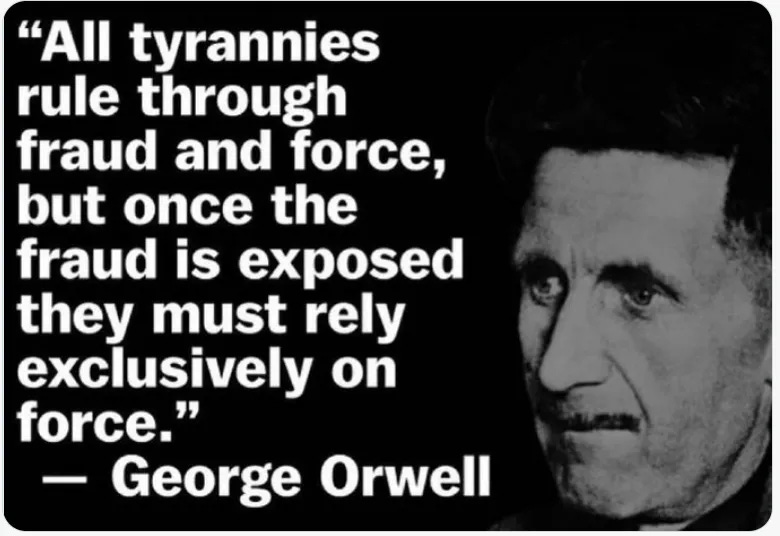
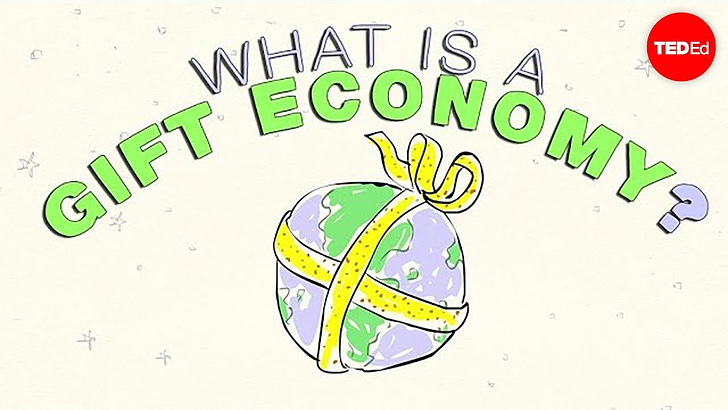
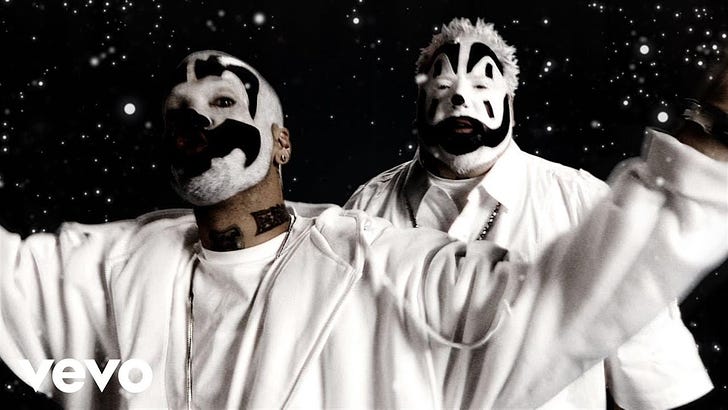



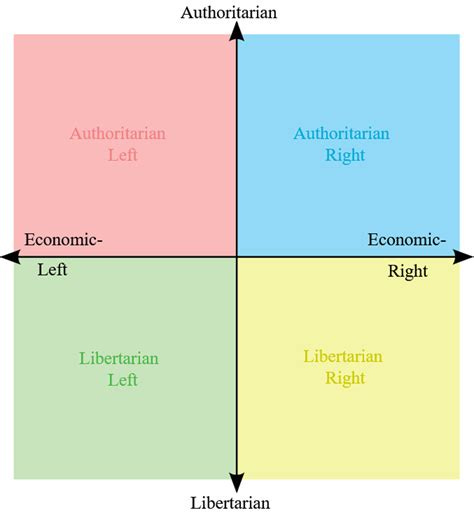
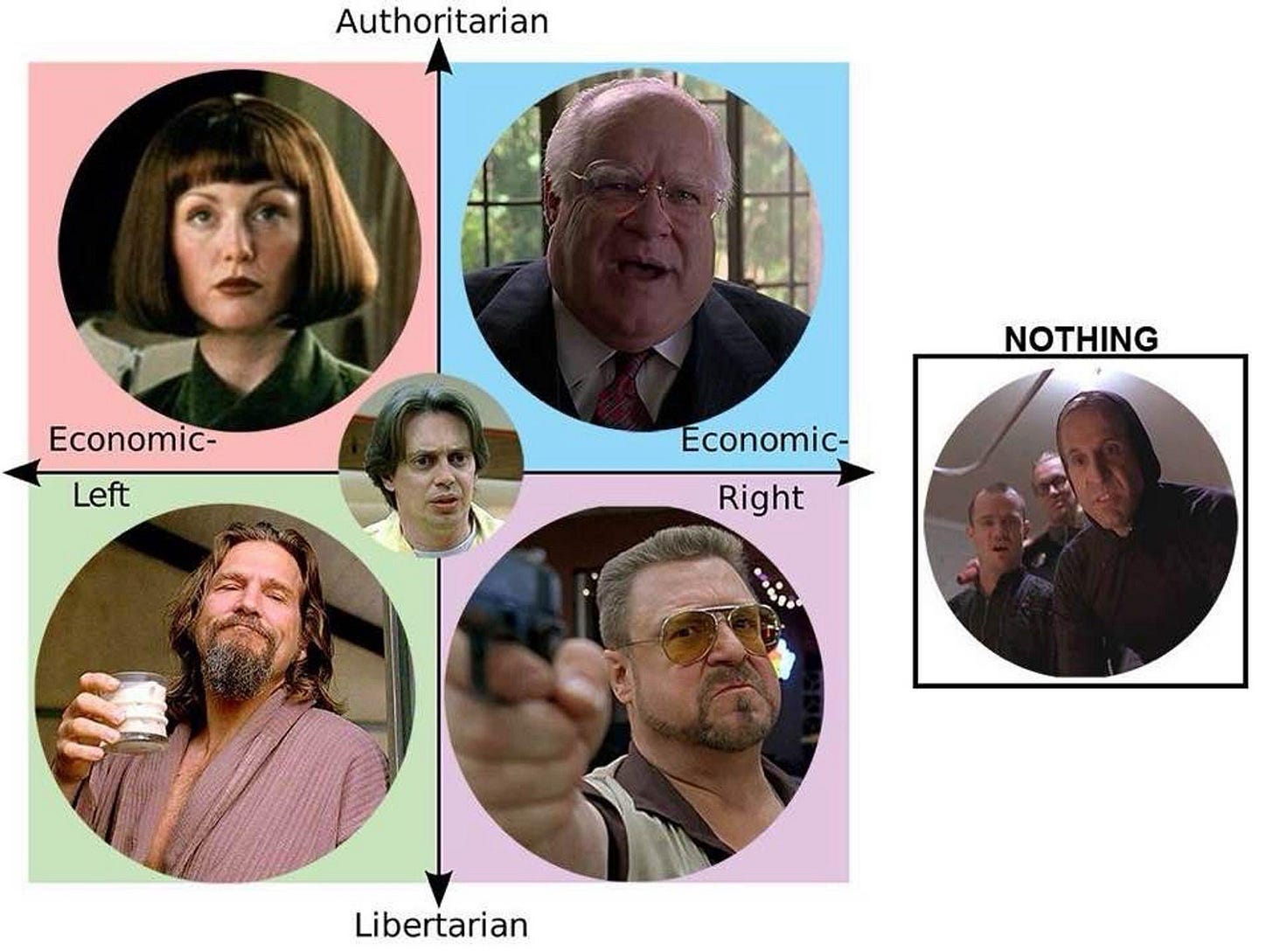

Excellent article. I think voluntaryism should be adopted if we hope to introduce anarchist principles to a much wider audience and create a genuine working alternative to the state and, hopefully, tackle statist beliefs. Unfortunately, I think anti-anarchist propaganda has been so effective and is so entrenched that it is now almost impossible to disentangle the word "anarchy" from the public's perception of "chaos." Frankly, defending and explaining the word "anarchism" at this point is an argument that will simply bog us down in counter-productive debate in my view.
Really looking forward to the discussion. I hope you will discuss how justice can be administered in a voluntary society. I am personally trying to wrestle with this at the moment and working and should have some posts on the issue shortly.
Great stuff. Keep up the good work.
I've seen the term voluntaryist used quite a bit by the libertarian and anarcho-capitalist crowd in a very Orwellian manner. I like the word, it just seems to me like its been appropriated by a crowd that has a very different definition of liberty and voluntary than I do.
In fact I'd argue the libertarian crowd doesn't want actual freedom. They want money to rule unchecked without a government force to impede the power of currency, which to me sounds more like they want a return to feudal lords.